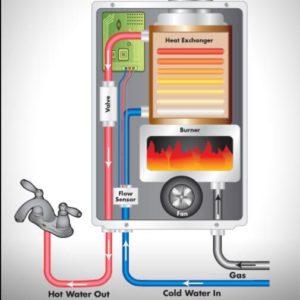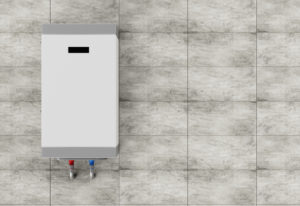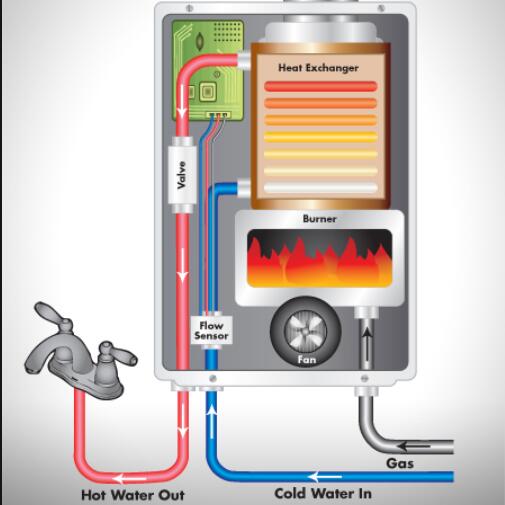How Does a Tankless Water Heater Work?
A tankless water heater is a cost-saving heater compared to regular heaters, which usually need large amounts of energy. This heater is easy to install as it does not require storage tanks to provide hot water. The tankless water heater has many different names such as inline water heater, demand water heater, point of use water heater, among others.

Tankless water heater work in a different way from conventional heaters, this heater has a sensor control which directs water into the radiator. A burner that is made for this burner then automatically starts, and water flows directly through the water exchanger. In response, it burns water to the required temperature. This process stops you switch off the hot water tap. The dial is made for adjusting temperature levels to the required standard. This ensures you never run out of hot water at any time.
The primary benefit of using a tankless water heater is the way they heat water when only needed, and this reduces the amount of energy you could use for standby moment. In many cases, the heater helps to save between twenty percent of the heating bill. It also reduces the chances of bacteria growth as it does not store hot water. Long-lasting equipment and lower cost of maintenance are other significant benefits. Many models also exist to choose from, such as; gas tankless water heaters and electric tankless water heaters. These heaters are available in different prices and sizes.
The tankless heating system is friendly and can be of many benefits when it comes to home use. However, when you turn on many taps, using one heater for all the taps, heating will also be minimized as a large volume of water is passing through the burner. Still, it’s possible to use multiple heaters for a large amount of hot water supply.
Are Tankless Water Heaters Dangerous?
A tankless water heater is a must-have addition to any home, especially for those in areas with particularly harsh winters. But, like all equipment that works with heat, these small devices have their share of dangers.

A hot shower should not be at the cost of a violent fire or fatal electric shock. The heat generated in itself is a danger to the household, while many of its electronic components are a dizzying mass of problems. These problems are challenging to detect unless a threat becomes imminent. Thus, simple things, such as a nearby garbage bin or faulty electronic wiring, can lead to tragedy if left unattended.
Since safety is the primary concern when it comes to water heaters, here is a short but short list of hazards to keep in mind:
DIY versus professional installation
Installation is the first step when it comes to the safety of a water heater without a tank. One erroneous step in this process can mean the difference between a safe house and a time bomb awaiting an explosion.
Questions like this may seem easy enough for simple homework, and some people are really able to fix it on their own. Operation manuals exist for a reason, and little experience in electronics and construction will help make the process workable. But, nevertheless, a professional is most recommended for such situations, since there are many thin points of heaters that require in-depth knowledge in this area.
Related materials
Heaters produce heat, and this heat can cause a fire if not handled properly. This can lead to a potential fire hazard in fabrics, textiles, paper, and wood if they are inadvertently left near the heating element of the heater.
These fire hazards should be carefully considered when installing and using a water heater without a tank. All types of flammable materials should be stored away from the heater, while building elements hidden in the wall, such as wooden poles, must be adequately insulated from heat so as not to weaken or even ignite since the heater has been used over time.
Moisture contents
Water heaters are designed to heat water and are designed in such a way that they are most often waterproof. However, some poor-quality tankless water heaters have some serious quality problems when it comes to water tightness outside the pipes leading to the heater.
The water-resistance of heaters varies by level. Some can withstand direct immersion, while the water-resistance of other models can only withstand foggy and humid conditions in the room. Carefully check the water-resistance of the water heater and consult a professional on how to deal with any problems with water resistance.
How Efficient Are Tankless Water Heaters?
Are tankless water heaters efficient? Yes, but let us understand how it affects you, let’s know how energy efficiency is derived for water heaters. Energy efficiency is measured as an energy factor (EF). The energy factor shows the water heater’s whole energy efficiency. This is known by the quantity of hot water which will be produced per unit of fuel used in a day. The measurement is based on the following factors:
- Recovery– How efficient the heat is to the water from the source of energy.
- Stand loss-This refers to the percentage of the heat that is lost from the tank in comparison with the content of heat of the water.
- Cycling loss-This show the heat loss at water circulates the pipes and tank.
Only one of the factors applies to thankless efficiency because there is no standby loss or recovery. The cycling loss will only be considered for the case where units don’t keep heat cycling in the unit.
Standard water heaters have a standard energy factor of .60. This indicates that about 60% of heat energy that is generated is used to heat water whereas 40% is lost in the process. Tankless water heaters have an energy factor of 0.80-0.99. You will reduce heat loss when using tankless and less fuel is consumed in heating the same volume of water.
Below are the types of fuel used:
- Gas tankless water heaters – Gas is 23% more efficient compared to traditional water heaters.
- Electric tankless water heaters – This requires a lot of amps to heat water.
In conclusion, tankless water heaters are more energy efficiency as seen above. Once you get rid of the essence of heating and storing water, your energy efficiency will increase and as a result, your costs of energy will reduce because you will use less fuel to heat your water for domestic purposes.
What is the Downside of a Tankless Water Heater?
Tankless water heaters can be a delicate issue for contractors and plumbers. This is because most people and homeowners looking to purchase a home are hoping to buy a home that is keen on energy-efficient homes, which are green-friendly and economical.
Because water heating is one of the most costly energy costs in homes, it makes sense to opt for energy-saving choices. Remember that in some cases, the percentage of energy costs that go into water heating may go up to 40 or even 50 percent. As a result, energy-saving hot water solutions can save a lot of cost to the overall energy bill.
Downsides of Tankless Water Heaters
- The main disadvantage of a tankless water heater begins with the upfront expense. Tankless water heaters cost twice conventional storage. A standard traditional water heater tank starts at $800 while standard tankless water heaters cost at around $1600
- There is an additional cost that comes with installations. Necessary piping can be costly. Remember that a tankless water heating system requires proper venting which can be expensive, but with an experienced plumber you can reduce these expenses
- In case of hard water, there must be a soften water in place so you will not destroy the tankless water heater.
- Another flaw is how complicated some units are. A tankless unit can be difficult and expensive, unlike conventional storage tanks. You will require a qualified plumber to do the task well.
On-demand, water heaters are split into either outdoor or indoor models. The outside models are more comfortable with making because they do not require complicated ventilation.
Because they are not covered in the rain and with freezing temperatures, they should be sealed than the indoor models. The cost with this weatherproofing tends to raise their prices but can set them up on an outside wall.



